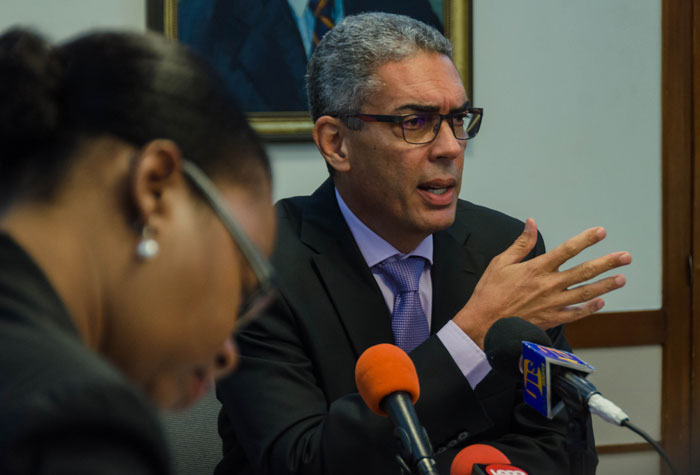EPOC Co-Chair Also Confident Jamaica Will Pass IMF Quarterly Test
By: , January 13, 2015The Key Point:
The Facts
- This follows similar sentiments expressed by Minister of Finance and Planning, Dr. the Hon. Peter Phillips, at a function in Montego Bay last week.
- Mr. Byles reiterated that the country has successfully met and surpassed all targets for November under its Extended Fund Facility (EFF) with the IMF, noting that “this positions Jamaica well to meet the seventh quarterly IMF test.”
The Full Story
Co-Chair of the Economic Programme Oversight Committee (EPOC), Richard Byles, is also expressing confidence that Jamaica will pass the seventh consecutive International Monetary Fund (IMF) quarterly test.
This follows similar sentiments expressed by Minister of Finance and Planning, Dr. the Hon. Peter Phillips, at a function in Montego Bay last week.
Addressing journalists at EPOC’s monthly press briefing on Tuesday, January 13, Mr. Byles reiterated that the country has successfully met and surpassed all targets for November under its Extended Fund Facility (EFF) with the IMF, noting that “this positions Jamaica well to meet the seventh quarterly IMF test.”
A review of the performance for the seventh quarter is currently underway by the IMF mission to Jamaica and the results will become available by the end of this month.
Mr. Byles indicated that contributing to the positive performance for the quarter under review is strong performance in the primary surplus and the Net International Reserves (NIR).
Data provided by EPOC show that for the quarter ending November 2014, the country’s primary surplus balance stood at $54.4 billion, which is $5.8 billion or 12.8 per cent better than the target of $48.2 billion. A primary surplus occurs when the Government’s income exceeds its expenditure.
Further, at the end of December the NIR stood at US$2.2 billion, which is US$740 million more than the IMF target of US$1.26 billion.
The NIR represents contingency funds, which can enable the country to survive severe external shocks and cope with shifts in investor confidence and natural disasters. It also acts as a measure of foreign goods and services that can be purchased over a period of time.
In the meantime, at the end of the quarter under review, the Government’s tax revenue was $224.5 billion, which was below budget by $8.1 billion.
Mr. Byles advised that this shortfall was due to an underperformance in company taxes and General Consumption Tax (GCT).
For the period, company taxes were $4.7 billion less than expected and collections from GCT were $6.9 billion less than targeted.
On the other hand, Mr. Byles said the PAYE (pay-as-you-earn) tax and Tax on Interest continue to over perform, with both exceeding the budget by $1.7 billion and $2.9 billion, respectively.
He noted that the Government compensated for the shortfall by cutting back on expenditure, which was $16.4 billion below budget, with the recurrent contributing $9 billion and capital, $7.4 billion.
Meanwhile, looking further ahead, the EPOC Co-Chair said the quarter of January to March 2015 is a critical period for the Government, as it strives to achieve the primary balance of $121 billion.
Mr. Byles said to meet this target, the Government will have to be aggressive in collecting every dollar of revenue as well as be very tight on the expenditure side.




